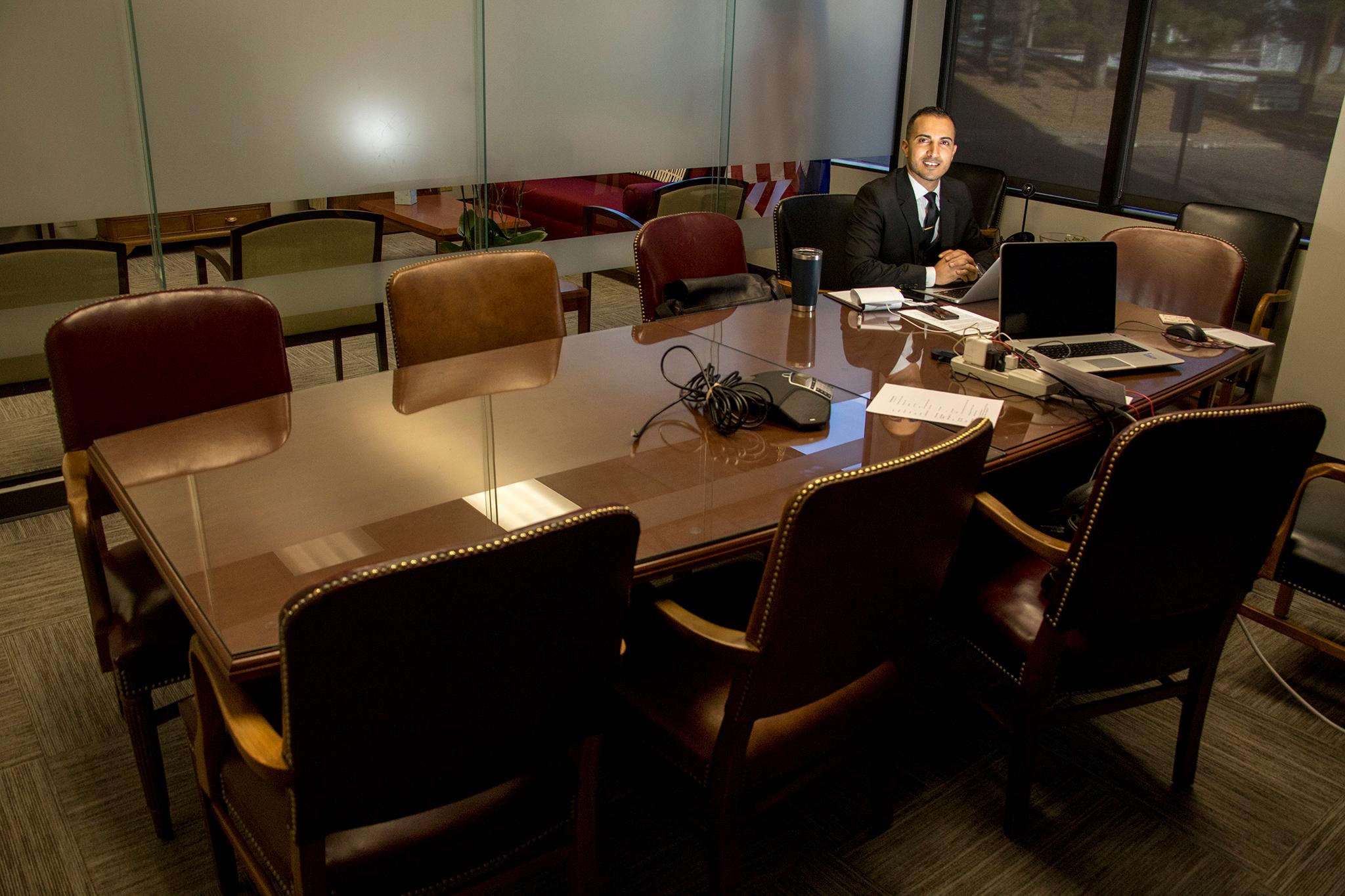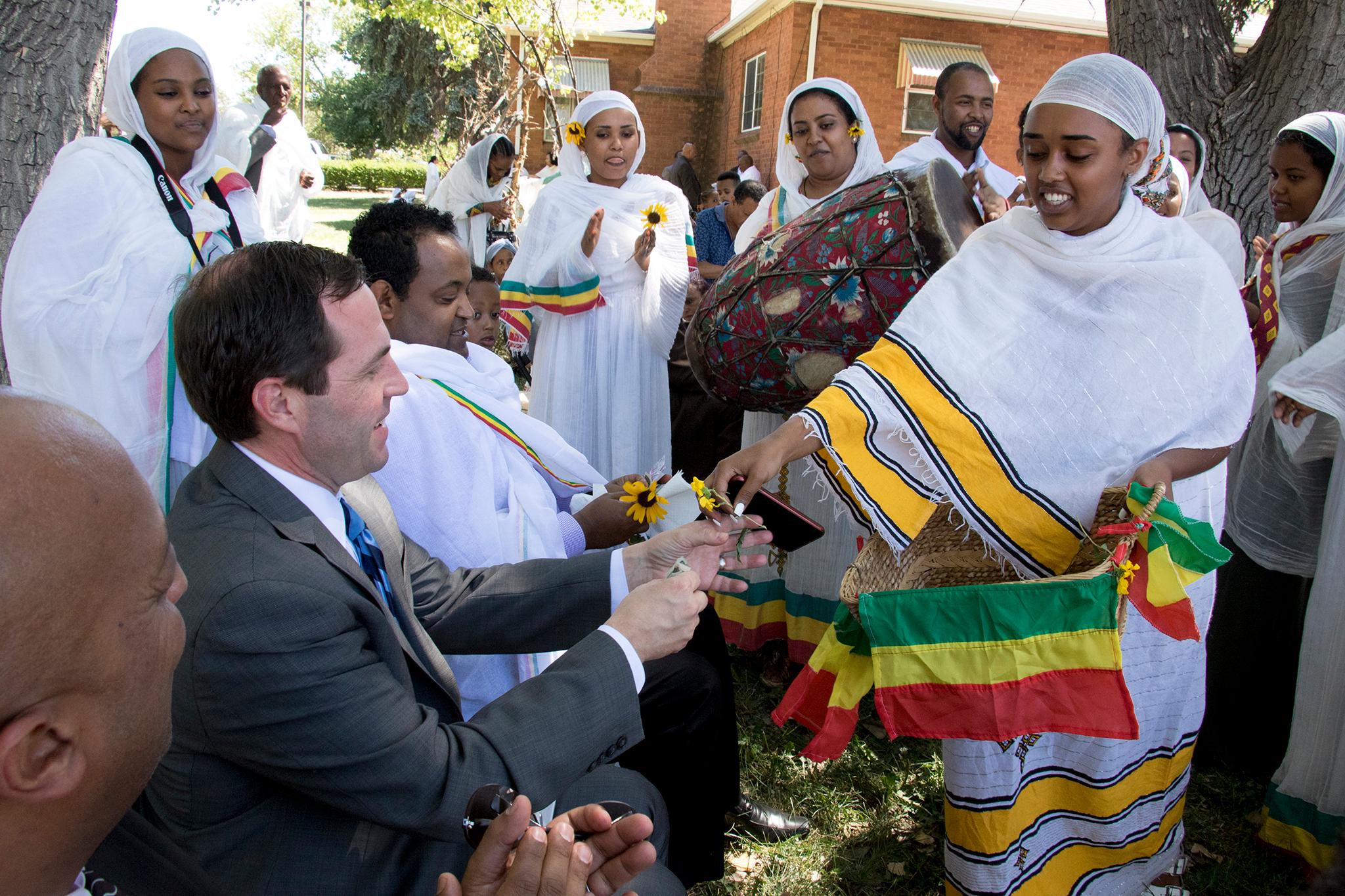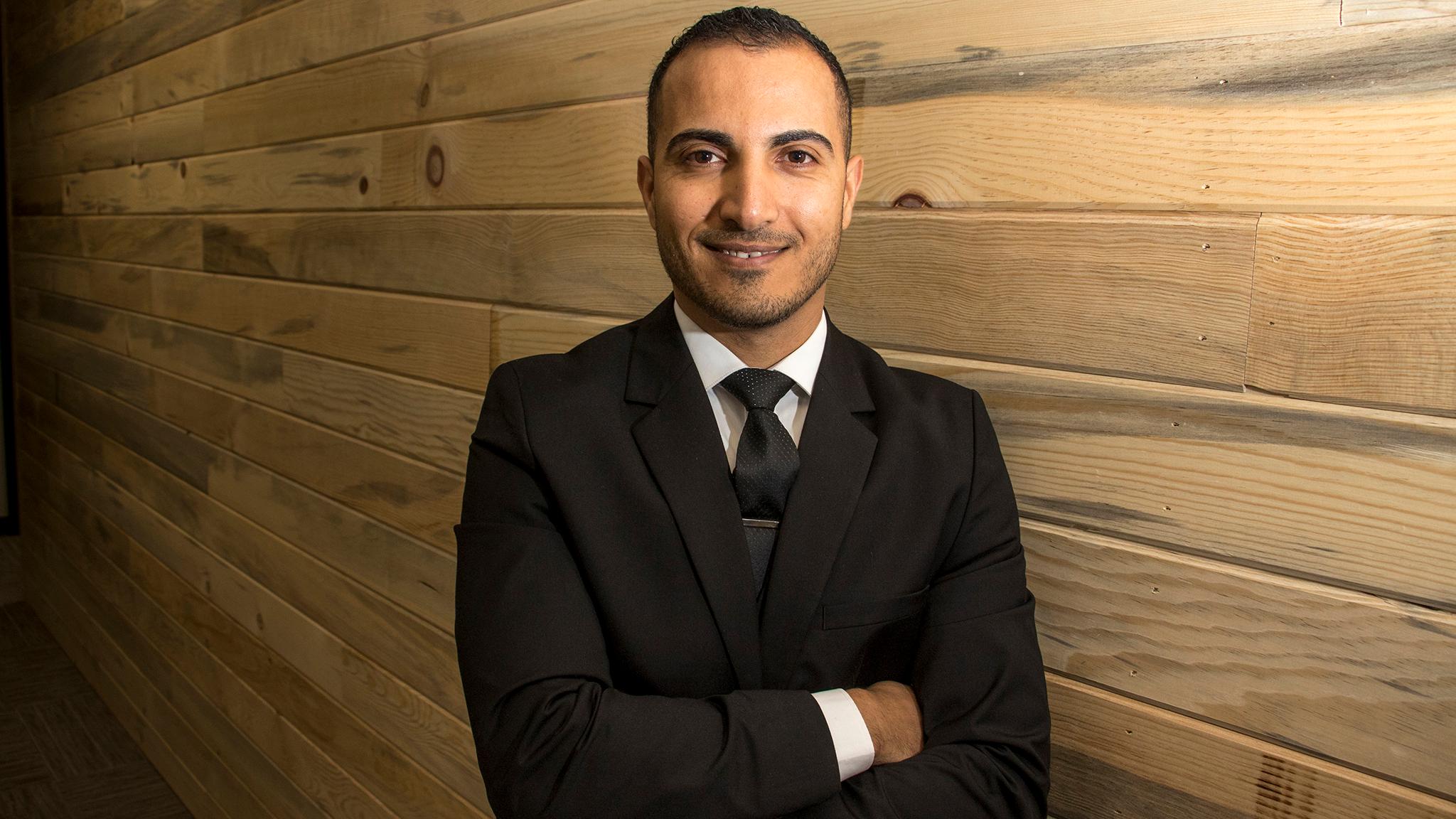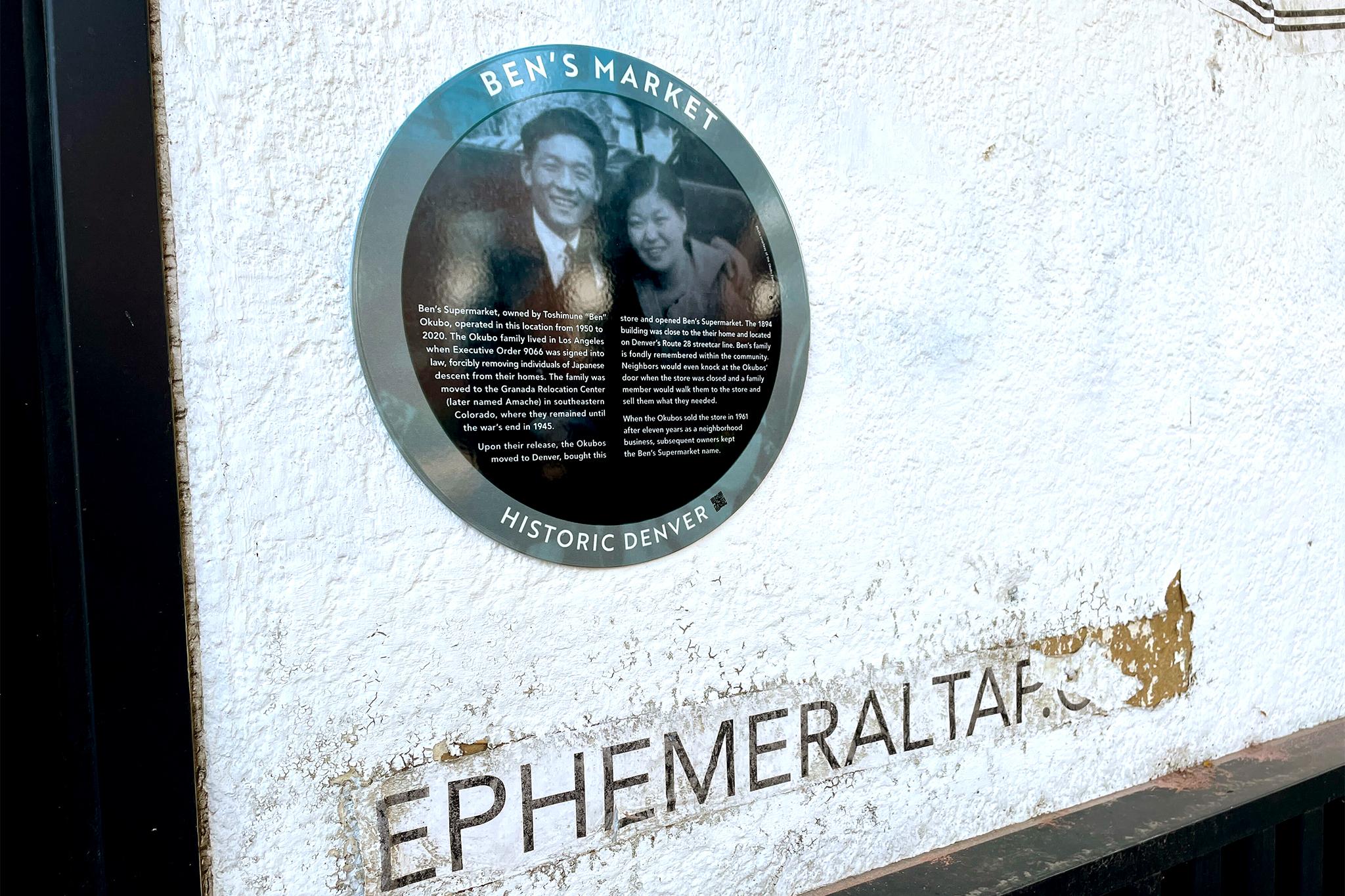It's tricky to concisely describe what Maytham Alshadood does -- or rather, what he has done. He's a nurse, a former combat interpreter and the founder of a local organization dedicated to helping immigrants and refugees with civic engagement.
At 33, he's compiled quite a list of accomplishments (and some attention from local press). Last year, newly-elected U.S. Rep. Jason Crow added another item to Alshadood's list, announcing he had hired him as district director. The position means Alshadood will be Crow's right-hand man in the sprawling 6th Congressional District. He will work primarily out of the district's offices in Aurora.
"I love where I live," Alshadood said recently inside a coffee shop there. "You can have three different meals in one day from three different cultural backgrounds, from three different corners of the world, within walking distances."
He plans on overseeing pop-up office hours in locations within the three counties in the district (Adams, Arapahoe and Douglas). Crow's staff have stayed in the same building where former district Congressman Mike Coffman had his office, though they've moved a couple of floors.
So where does the new job rank on his personal accomplishment list?
"This is the crown, so far," Alshadood said. "Considering everything I've done in my life, and I've done quite a few things, this is unlike anything else."
From the outside, it's a fairly straightforward job. He will serve as Crow's eyes and ears in the district, keeping constituents across three counties feeling like the congressman is there even when he's in Washington. He will keep a pulse on the district and report back to Crow.
For Alshadood, the position is another chance to tackle stereotypes about what a Middle Eastern man can do. He says he's not a guy who was always presented with the best options in life. So this choice was relatively easy.
"It has a lot to do with challenging norms, challenging stereotypes, challenging the status quo," Alshadood said. "I know all these sounds like buzzwords, but to me, they're many molds that people try to make you fit into. And sometimes it's not easy to break out of, because too many people believe that you should fit into that mold and nothing else."

Alshadood grew up in Iraq and worked with U.S. troops as a combat interpreter from 2005 to 2008. He arrived in the United States shortly before President Obama was elected. He was able to come to the U.S. with a Special Immigrant Visa, a program available for Iraqi and Afghan translators who worked alongside U.S. Armed Forces.
He began nursing prerequisite classes in 2010 and a nursing program at the University of Colorado Anschutz Medical Campus in 2014. He graduated in 2016 but started working at the university's transplant unit in 2015 while still a student. While studying he was involved in research, and his studies were published in the International Journal of Migration, Health and Social Care.
Though the new position will mark the first time Alshadood works for an elected official, he's been directly involved in the political arena since he founded DRIVE Project in 2017.
He still serves as the executive director (he's currently figuring out who will replace him). The organization tries to keep immigrant and refugee families involved in civic engagement.
That may not necessarily come naturally for folks resettled in the U.S. After all, Alshadood pointed out, for many immigrants or refugees, oppression is a common experience. They may have left their homeland over potential or real persecution. It can lead to a complete disinterest in politics.
"We come from countries where we're expected to work for politicians, then we come to the United States where politicians are expected to work for people," Alshadood said.
The organization has found results. Last year, they helped craft a successful bill providing in-state tuition for students to refugees and special immigrants. He felt proud of his team for pushing for a bill he said will serve many generations to come.
It was a big win and proof of what citizens were capable of doing when they organized. But, like the aim in his new job, his goals have a larger scope. He wants to challenge the narrative often associated with immigrants and refugees as people in need of a handout.
"Let's talk about them in terms of people that might have served and sacrificed for our country, even before coming here,"Alshadood said. "Let's talk about them in terms of people who have a lot to offer to our nation -- and that's what I'm trying to reflect in almost everything I do."
Palwasha Khan, marketing director at DRIVE, has known Alshadood for two years. The two bonded over their shared goal to support refugees, a personal topic for Khan, who said she has a cousin who's a refugee settled in France.
She wanted to work with Alshadood because of his passion, not only because of his goal to be a part of groups helping out refugees.
"Maytham sees the world for what it is and wants to make it better," Khan said. "That notion just makes it very easy for him to work with. Every time I'm with him, it's like a burst of inspiration, a burst of motivation."

He will need to do something similar for Congress. Just like he showed community members what DRIVE was capable of doing in the General Assembly, he will need to bring examples of what's possible in Washington. He will need to show them how those laws affect lives and how Crow's work provides checks and balances.
In other words, he's taking it upon himself to provide a clear picture to community members of what a politician is and isn't. He said he wants politicians to move beyond photo-ops at houses of worship or cultural events.
"My job is going to be explaining that no, that's not really good enough," He said. "Let's talk about it in realistic terms. What is the job of a congressman or congresswoman and what they can really do for you."
Alshadood met Crow through his work at DRIVE.
They first met while Crow was in the thick of his primary campaign. Alshadood knew the seat Crow was after formed a vital piece of Democrats' plan to take back the House.
Alshadood was left with the impression of a man he called "methodical and disciplined." He believes Crow will be a voice for immigrants and refugees in Congress.
"That's one thing that I admire, is the discipline," Alshadood said. "That's something that I relate to because I grew up in a military family, I worked with the military, and I understand how valuable discipline is."
When Crow announced Alshadood as District Director, he lauded him and incoming Chief of Staff Alex Ball as helping put his team "in a position to succeed." He name-checked them as part of his goal to bring "a new generation of leadership to Washington," which had been one of Crow's signature campaign promises.
"As we work together to build a new generation of leadership in Washington, Alex and Maytham's knowledge, talent, expertise and deep love of Colorado and its people put us in a position to succeed," Crow said in a statement last month. "I'm thrilled to welcome them onboard to lead our team and look forward to working with them to take on the most important issues in our community and country."
As he begins his work for a Congressman, it's hard not to see Alshadood's development and begin picturing him headed for a similar position. At least, his DRIVE coworker Kahn hopes so.
"We're all rooting for that. He really is an agent for the people," Khan said.
It's clear why he chose the path that brought him within steps of Capitol Hill. He admits he wasn't expecting to end up in a position like this so soon, so close to someone capable of changing the country's law.
What else would he be doing? When faced with questions about what would have happened if he hadn't ended up in the United States, after serving in conflict before arriving in safety in America, things get murkier.
"I would probably be-" he said, before pausing. "I don't know. I really don't want to think about the possibilities."
And in his new job, he likely won't have to.













